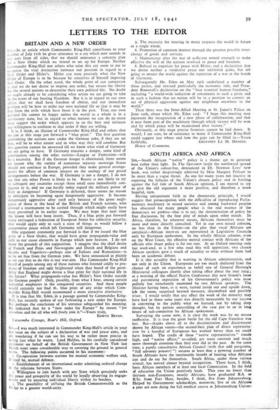LETTERS TO THE EDITOR
BRITAIN AND A NEW ORDER
Sm,—In an article which Cominander King-Hall contributes to your number of July 11th he gives utterance to a cry which now sounds in our ears from all sides, that we should announce a concrete plan for a New Order which we intend to set up for Europe. Neither Commander King-Hall nor others who raise this cry seem to me to 1e6.ognise the vital distinction between our position in regard to a New Order and Hitler's. Hitler can state precisely what the New Order of Europe is to be because he conceives of himself imposing that Order. On the other nand, the whole point of our contention is that we do not desire to impose any order, but secure the liberty for the several nations to determine their own political life. No doubt we ought already to be considering what action we are going to take in the event of our beating Nazidom. But it is in regard to our own affairs that we shall have freedom of choice, and our immediate problem will be how to order our own national life so that it may be free from the evils which have beset it in the past. True, our own national life cannot be happy unless the world as a whole is in a satisfactory state, but in regard to other nations we can do no more than suggest the order which appears to us the best and intimate our willingness to conform to that order if they are willing.
It is, I think, an illusion of Commander King-Hall and others that we can at this stage put forward a " blue print." The first question confronting the nations now under the German yoke, if they are set free, will be to what extent and in what way they will combine. But this question cannot be answered till we know what kind of Germany we are going to have. If Germany remains a danger, some kind of combination among the other nations—League or Federation—will be a necessity. But if the German danger is eliminated, there seems no reason why the variety of numerous separate sovereign States should not continue in Europe, provided they make general arrange- ments for affairs of common interest on the analogy of our postal arrangements before the war. If Germany is not a danger, I do not see that any other Power is likely to be. Russia is not likely to try to subjugate any countries except those small ones immediately con- tiguous to it, and we can hardly today regard the military power of Italy as dangerous! If Germany is defeated, there seems no reason to anticipate its becoming again dangerously aggressive. It became dangerously aggressive after 1918 only because of the gross negli- gence of those at the head of the British and French nations, who allowed a rearmament to be carried through which might easily have been prevented in its earlier stages. We may hope that next time the lesson will have been learnt. Thus, if a blue print put forward today envisaged a federation of European States for collective security, that would apply only to such a state of things as would follow a compromise peace which left Germany still dangerous.
One argument commonly put forward is that if we issued the blue print of a New Order, that would have great propaganda-value and rally to our cause elements in Europe which now hesitate. I do not know the grounds of this supposition. I imagine that the chief desire of French and Poles and Norwegians and Dutch and Belgians and Greeks and Yugoslays—perhaps also of Italians and Rumanians—is to be set free from the German yoke. We have announced as plainly as we can that to do this is our war-aim. Has Commander King-Hall heard of people among any of these nations who listened coldly to pro- mises of freedom and only brightened when they heard of the possi- bility that England might devise a blue print for their national life in the future? What propaganda-value has Hitler's New Order outside the German people? Only, possibly, from what I hear, among certain industrial employers in the conquered countries. And these people would certainly not find tb- blue print of any order which Com- mander King-Hall would recommend a more attractive alternative. It is true that Mr. Eden, in a passage quoted by Commander King- Hall, has recently spoken of our fashioning a new order for Europe. But perhaps the conclusion of his sentence safeguarded his meaning. He indicated that by a "new order for Europe " he meant "for ourselves and for all who will freely join it."—Yours truly,

























 Previous page
Previous page